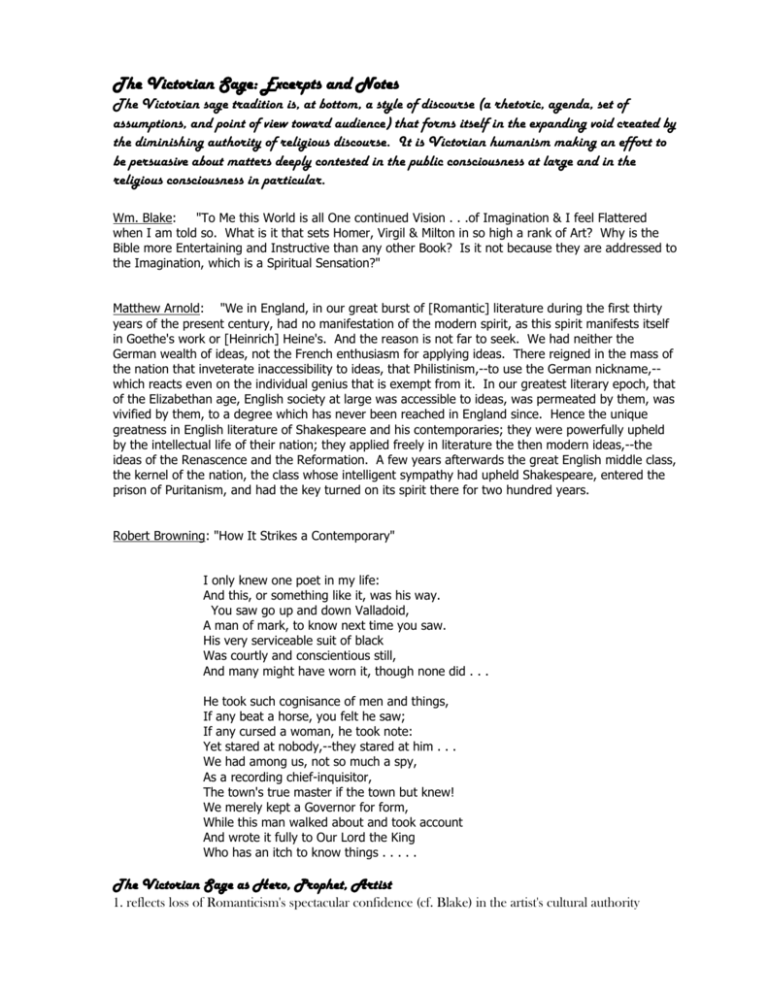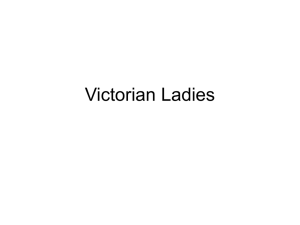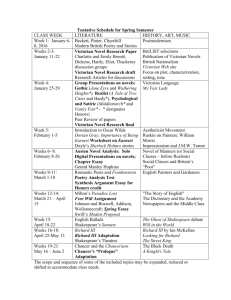The Victorian Sage: Excerpts and Notes
advertisement

The Victorian Sage: Excerpts and Notes The Victorian sage tradition is, at bottom, a style of discourse (a rhetoric, agenda, set of assumptions, and point of view toward audience) that forms itself in the expanding void created by the diminishing authority of religious discourse. It is Victorian humanism making an effort to be persuasive about matters deeply contested in the public consciousness at large and in the religious consciousness in particular. Wm. Blake: "To Me this World is all One continued Vision . . .of Imagination & I feel Flattered when I am told so. What is it that sets Homer, Virgil & Milton in so high a rank of Art? Why is the Bible more Entertaining and Instructive than any other Book? Is it not because they are addressed to the Imagination, which is a Spiritual Sensation?" Matthew Arnold: "We in England, in our great burst of [Romantic] literature during the first thirty years of the present century, had no manifestation of the modern spirit, as this spirit manifests itself in Goethe's work or [Heinrich] Heine's. And the reason is not far to seek. We had neither the German wealth of ideas, not the French enthusiasm for applying ideas. There reigned in the mass of the nation that inveterate inaccessibility to ideas, that Philistinism,--to use the German nickname,-which reacts even on the individual genius that is exempt from it. In our greatest literary epoch, that of the Elizabethan age, English society at large was accessible to ideas, was permeated by them, was vivified by them, to a degree which has never been reached in England since. Hence the unique greatness in English literature of Shakespeare and his contemporaries; they were powerfully upheld by the intellectual life of their nation; they applied freely in literature the then modern ideas,--the ideas of the Renascence and the Reformation. A few years afterwards the great English middle class, the kernel of the nation, the class whose intelligent sympathy had upheld Shakespeare, entered the prison of Puritanism, and had the key turned on its spirit there for two hundred years. Robert Browning: "How It Strikes a Contemporary" I only knew one poet in my life: And this, or something like it, was his way. You saw go up and down Valladoid, A man of mark, to know next time you saw. His very serviceable suit of black Was courtly and conscientious still, And many might have worn it, though none did . . . He took such cognisance of men and things, If any beat a horse, you felt he saw; If any cursed a woman, he took note: Yet stared at nobody,--they stared at him . . . We had among us, not so much a spy, As a recording chief-inquisitor, The town's true master if the town but knew! We merely kept a Governor for form, While this man walked about and took account And wrote it fully to Our Lord the King Who has an itch to know things . . . . . The Victorian Sage as Hero, Prophet, Artist 1. reflects loss of Romanticism's spectacular confidence (cf. Blake) in the artist's cultural authority 2. attempts re-appropriating this power by identifying the artist with such exalted figures as Old Testament prophets, Plato's Philosopher-King or a highly selective tradition of what Hegel called "world-historical" figures such as Homer, Dante, Shakespeare, and (for some) Goethe. 3. makes some effort to compensate for an historical drift toward democracy by re-inventing the old aristocratic model of the "exceptional man" 4. conflicted about what the artist offers: truth? beauty? both? one as the other? results (often) in a "moral-aesthetic" which covers both possibilities 5. prose writers in the Victorian sage tradition conceive their position as doubtfully on a par with poets (to whom they defer) but as more genuine than that of novelists (whom they patronize) Holloway, however, shows that the novelists assimilated the voice of the sage while the sage often borrowed the techniques of the novelists 6. the sage assumes greater access to public consciousness in the early Victorian period than later on 7. as critics of culture, the sages see themselves as thinking the thoughts of a certain level of public consciousness out loud--thus articulating "the spirit of the age"







